| Listing 1 - 8 of 8 |
Sort by
|
Book
ISBN: 9789464147926 Year: 2022 Publisher: Leuven Acco
Abstract | Keywords | Export | Availability | Bookmark
 Loading...
Loading...Choose an application
- Reference Manager
- EndNote
- RefWorks (Direct export to RefWorks)
Wiskunde --- 517 --- Algebra --- Analyse : Fourier transformaties --- Analyse : Laplace transformaties
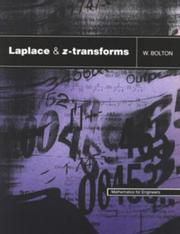
ISBN: 0582228190 9780582228191 Year: 1994 Publisher: Harlow : Longman,
Abstract | Keywords | Export | Availability | Bookmark
 Loading...
Loading...Choose an application
- Reference Manager
- EndNote
- RefWorks (Direct export to RefWorks)
Laplace-transformaties. --- Z-transformatie. --- Laplace transformation. --- Z transformation.
Book
Abstract | Keywords | Export | Availability | Bookmark
 Loading...
Loading...Choose an application
- Reference Manager
- EndNote
- RefWorks (Direct export to RefWorks)
Mathématiques --- Wiskunde --- Academic collection --- 517.9 --- Analyse : Besselfuncties --- Analyse : Diracfunctie --- Analyse : Fourier analyse --- Analyse : Laplace transformaties --- Analyse : lineaire differentiaalvergelijkingen --- Differentiaalvergelijkingen --- Niet-lineaire vergelijkingen --- Differentiaalvergelijkingen. --- Niet-lineaire vergelijkingen.
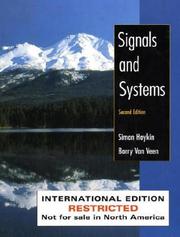
ISBN: 0471378518 0471164747 9780471378518 9780471707899 9780471164746 0471707899 Year: 2003 Publisher: New York: Wiley,
Abstract | Keywords | Export | Availability | Bookmark
 Loading...
Loading...Choose an application
- Reference Manager
- EndNote
- RefWorks (Direct export to RefWorks)
Analyse : Fourier analyse --- Laplace transformaties --- Z-transformaties --- Telecommunicatiesystemen --- Systeemanalyse --- Signaalverwerking --- 621.38 --- Linear time invariant system --- Linear time invariant systems --- Signal processing --- System Analysis --- Telecommunication systems
Book
ISBN: 0023977205 9780023977206 Year: 1974 Publisher: New York (N.Y.): MacMillan,
Abstract | Keywords | Export | Availability | Bookmark
 Loading...
Loading...Choose an application
- Reference Manager
- EndNote
- RefWorks (Direct export to RefWorks)
Differential equations --- Equations différentielles --- Analyse : Laplace transformaties --- Analyse : differentiaalvergelijkingen --- Analyse : Fourier analyse --- 517.2 --- Differential equations. --- Equations différentielles --- 517.91. --- 517.91 Differential equations --- Numerical solutions --- 517.91
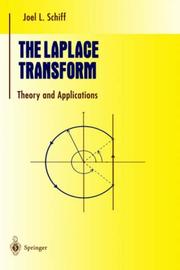
ISBN: 0387986987 1475772629 9786610145751 1280145757 0387227571 Year: 1999 Publisher: New York (N.Y.) : Springer,
Abstract | Keywords | Export | Availability | Bookmark
 Loading...
Loading...Choose an application
- Reference Manager
- EndNote
- RefWorks (Direct export to RefWorks)
The Laplace transform is a wonderful tool for solving ordinary and partial differential equations and has enjoyed much success in this realm. With its success, however, a certain casualness has been bred concerning its application, without much regard for hypotheses and when they are valid. Even proofs of theorems often lack rigor, and dubious mathematical practices are not uncommon in the literature for students. In the present text, I have tried to bring to the subject a certain amount of mathematical correctness and make it accessible to un dergraduates. Th this end, this text addresses a number of issues that are rarely considered. For instance, when we apply the Laplace trans form method to a linear ordinary differential equation with constant coefficients, any(n) + an-lY(n-l) + · · · + aoy = f(t), why is it justified to take the Laplace transform of both sides of the equation (Theorem A. 6)? Or, in many proofs it is required to take the limit inside an integral. This is always fraught with danger, especially with an improper integral, and not always justified. I have given complete details (sometimes in the Appendix) whenever this procedure is required. IX X Preface Furthermore, it is sometimes desirable to take the Laplace trans form of an infinite series term by term. Again it is shown that this cannot always be done, and specific sufficient conditions are established to justify this operation.
Laplace transformation. --- Laplace transformaties --- 519.6 --- Laplace transformation --- Mathematics. --- Mathematical analysis. --- Analysis (Mathematics). --- Analysis. --- Global analysis (Mathematics). --- Transformation, Laplace --- Calculus, Operational --- Differential equations --- Transformations (Mathematics) --- 517.1 Mathematical analysis --- Mathematical analysis
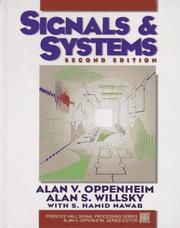
ISBN: 0138147574 0136511759 9780138147570 9780136511755 Year: 1997 Publisher: Upper Saddle River, N.J.: Prentice Hall,
Abstract | Keywords | Export | Availability | Bookmark
 Loading...
Loading...Choose an application
- Reference Manager
- EndNote
- RefWorks (Direct export to RefWorks)
Signal theory (Telecommunication). --- System analysis. --- Théorie du signal (Télécommunications) --- Digitale tijdsystemen --- Z-transformaties --- Laplace transformaties --- Théorie du signal (Télécommunications) --- Signal theory (Telecommunication) --- Analyse de systèmes --- System analysis --- 621.38 --- Analyse : Fourier transformaties --- Network theory --- Systems analysis --- System theory --- Mathematical optimization --- Electric signal theory --- Electric waves --- Signal detection --- Telecommunication --- Network analysis --- Network science --- 621.395 --- 621.395 Telephony --- Telephony --- System Analysis --- Telecommunicatie --- systems analysis --- Mathematical models --- computer applications --- design --- Data processing --- Signal, Théorie du (télécommunications) --- Systèmes, Analyse de. --- Signal, Théorie du (télécommunications) --- Systèmes, Analyse de.
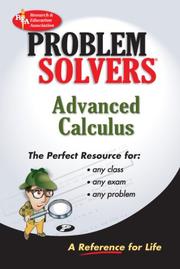
ISBN: 0878915338 Year: 1987 Publisher: New York : REA,
Abstract | Keywords | Export | Availability | Bookmark
 Loading...
Loading...Choose an application
- Reference Manager
- EndNote
- RefWorks (Direct export to RefWorks)
Mathematical analysis --- 517 --- Analyse (wiskunde) --- Laplace --- Maximum --- Minimum --- Reeksen --- Vectoranalyse --- Wiskunde --- differentiaalvergelijkingen --- 167 --- Analyse : Fourier analyse --- Analyse : Fourier transformaties --- Analyse : Laplace transformaties --- Analyse : afgeleiden --- Analyse : differentialen --- Analyse : integralen --- Analyse : rechten --- Analyse : rijen --- Wiskunde : probleemoplossend denken --- calculus --- Calculus --- Analysis (Mathematics) --- Fluxions (Mathematics) --- Infinitesimal calculus --- Limits (Mathematics) --- Functions --- Geometry, Infinitesimal --- 517 Analysis --- Analysis --- #WBIB:dd.Lic.L.De Busschere --- 51(076.1) --- Laplacetransformatie --- analyse --- complexe variabelen --- differentialen --- fourieranalyse --- fourierreeksen --- integralen --- maxima wiskunde --- meetkunde --- minima --- oefeningen --- oneindige reeksen --- oppervlakteintegralen --- partiële afgeleiden --- reeksen --- vectorruimten --- wiskunde --- Mathematics --- Problems, exercises, etc. --- Wiskundige analyse : vraagstukken. --- Calcul différentiel --- Calcul intégral --- Advanced calculus --- Exercices
| Listing 1 - 8 of 8 |
Sort by
|

 Search
Search Feedback
Feedback About UniCat
About UniCat  Help
Help News
News